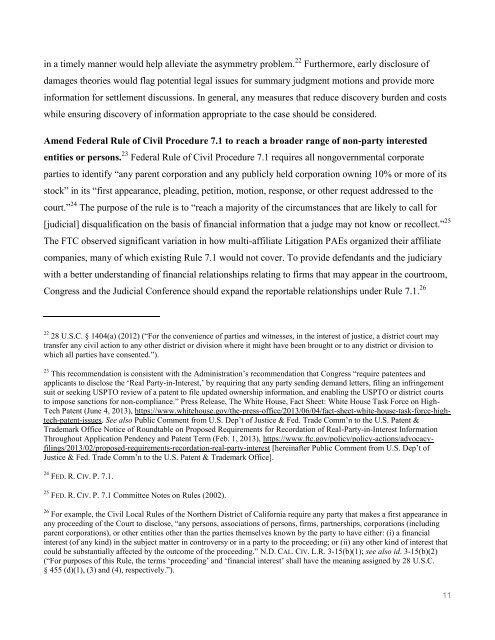You also want an ePaper? Increase the reach of your titles
YUMPU automatically turns print PDFs into web optimized ePapers that Google loves.
in a timely manner would help alleviate the asymmetry problem. 22 Furthermore, early disclosure of<br />
damages theories would flag potential legal issues for summary judgment motions and provide more<br />
information for settlement discussions. In general, any measures that reduce discovery burden and costs<br />
while ensuring discovery of information appropriate to the case should be considered.<br />
Amend Federal Rule of Civil Procedure 7.1 to reach a broader range of non-party interested<br />
entities or persons. 23 Federal Rule of Civil Procedure 7.1 requires all nongovernmental corporate<br />
parties to identify “any parent corporation and any publicly held corporation owning 10% or more of its<br />
stock” in its “first appearance, pleading, petition, motion, response, or other request addressed to the<br />
court.” 24 The purpose of the rule is to “reach a majority of the circumstances that are likely to call for<br />
[judicial] disqualification on the basis of financial information that a judge may not know or recollect.” 25<br />
The FTC observed significant variation in how multi-affiliate Litigation PAEs organized their affiliate<br />
companies, many of which existing Rule 7.1 would not cover. To provide defendants and the judiciary<br />
with a better understanding of financial relationships relating to firms that may appear in the courtroom,<br />
Congress and the Judicial Conference should expand the reportable relationships under Rule 7.1. 26<br />
22<br />
28 U.S.C. § 1404(a) (2012) (“For the convenience of parties and witnesses, in the interest of justice, a district court may<br />
transfer any civil action to any other district or division where it might have been brought or to any district or division to<br />
which all parties have consented.”).<br />
23<br />
This recommendation is consistent with the Administration’s recommendation that Congress “require patentees and<br />
applicants to disclose the ‘Real Party-in-Interest,’ by requiring that any party sending demand letters, filing an infringement<br />
suit or seeking USPTO review of a patent to file updated ownership information, and enabling the USPTO or district courts<br />
to impose sanctions for non-compliance.” Press Release, The White House, Fact Sheet: White House Task Force on High-<br />
Tech <strong>Patent</strong> (June 4, 2013), https://www.whitehouse.gov/the-press-office/2013/06/04/fact-sheet-white-house-task-force-hightech-patent-issues.<br />
See also Public Comment from U.S. Dep’t of Justice & Fed. Trade Comm’n to the U.S. <strong>Patent</strong> &<br />
Trademark Office Notice of Roundtable on Proposed Requirements for Recordation of Real-Party-in-Interest Information<br />
Throughout Application Pendency and <strong>Patent</strong> Term (Feb. 1, 2013), https://www.ftc.gov/policy/policy-actions/advocacyfilings/2013/02/proposed-requirements-recordation-real-party-interest<br />
[hereinafter Public Comment from U.S. Dep’t of<br />
Justice & Fed. Trade Comm’n to the U.S. <strong>Patent</strong> & Trademark Office].<br />
24<br />
FED. R. CIV. P. 7.1.<br />
25<br />
FED. R. CIV. P. 7.1 Committee Notes on Rules (2002).<br />
26<br />
For example, the Civil Local Rules of the Northern District of California require any party that makes a first appearance in<br />
any proceeding of the Court to disclose, “any persons, associations of persons, firms, partnerships, corporations (including<br />
parent corporations), or other entities other than the parties themselves known by the party to have either: (i) a financial<br />
interest (of any kind) in the subject matter in controversy or in a party to the proceeding; or (ii) any other kind of interest that<br />
could be substantially affected by the outcome of the proceeding.” N.D. CAL. CIV. L.R. 3-15(b)(1); see also id. 3-15(b)(2)<br />
(“For purposes of this Rule, the terms ‘proceeding’ and ‘financial interest’ shall have the meaning assigned by 28 U.S.C.<br />
§ 455 (d)(1), (3) and (4), respectively.”).<br />
11


